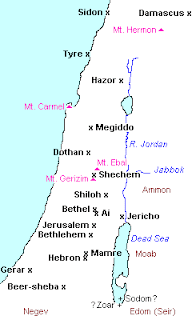I never thought I'd be writing on evil at Christmas time. But I also never dreamed that a nightmare like the Sandy Hook Elementary School tragedy could ever take place.
"When Herod saw that he had been tricked by the wise men, he was infuriated, and he sent and killed all the children in and around Bethlehem who were two years old or under, according to the time that he had learned from the wise men. Then was fulfilled what had been spoken through the prophet Jeremiah: "A voice was heard in Ramah, wailing and loud lamentation, Rachel weeping for her children; she refused to be consoled, because they are no more."
- Matthew 2:16-18This is the world Christ was born into.
It was a dangerous world, a fragile world, a world where Herod was king. Herod was known for his brutality and for letting nothing stand in the way of his desire for power; so much so that he killed one of his wives and two of his sons when he felt they were plotting against him. Jesus was born into a world where Herod was king.
This is the world in which we live.
It's a world where sometimes unspeakable evil happens. Rabbi Harold Kushner once wrote that what makes something truly evil is, "it prevents people from believing in God's goodness" (When Bad Things Happen to Good People, p. 53).
This is the world Christ came to redeem.
This is world he came to save. This is the world he came to love. This is the world that needs his light. And this is the world he will return to to transform.
The light shines in the darkness and the darkness will never put it out. This is at the heart of Christmas.
Prayer: Help us to cling to faith and hope, O God, even in the face of evil. In the name of our crucified and risen Savior. Amen.
 |
| The Wise Men warm Joseph & Mary to flee Herod. |
(The thoughts above are taken largely from a message by the late Dr. James I. McCord, former president of Princeton Theological Seminary.)
Extra Credit:
A Prayer for the Sandy Hook Tragedy
By the Rev. James Martin, SJ - Jesuit priest
Where were you, God?
We are crushed with grief, God.
We cannot bear to think of so many people killed.
We cannot bear to think of children being killed.
It is unthinkable to us, the worst tragedy. Children.
Where were you, God? How could you let this happen?
Why is your world like this? We are sad and angry and confused.
But God, we know that you know what it means to have a child die.
For your Son died a violent death.
And we know that your Son understands grief.
For he wept bitterly when his friend Lazarus died.
And he was moved with compassion when he saw suffering.
His heart broke like our hearts do. He cried like we do today.
We know too that your Son raised Lazarus from the dead.
And that you raised your own murdered Son from the grave,
As a sign of the eternal life you have planned for us.
The life into which you now place the victims, whom you loved. And love.
We know that you understand our terrible anguish.
You accept our bitterness and our confusion too.
And we know that your Son is beside us, weeping with us.
We know that you are still with us God, in the darkness.
In our compassion for the families and friends of the victims.
In the love that moves us to care for one another.
In the anger that drives us to strive to put an end to violence,
As your Son tried to do in his time with us.
Most of all, eternal rest grant unto them, O Lord,
And let perpetual light shine upon them.
You said, "Blessed are those who mourn for they will be comforted.
Comfort them, Loving God.
Comfort every grieving parent, every scared and confused child, every first responder.
Teach us your ways, and lead us toward your everlasting light, that light that always shines and that the darkness can never put out. Amen.
"I believe in the sun, even when it is not shining.
I believe in love, even when I don't feel it.
I believe in God, even when there is silence."
-Words scratched on the walls of a cellar in Cologne, Germany by a Jew hiding from Nazi persecution.











































